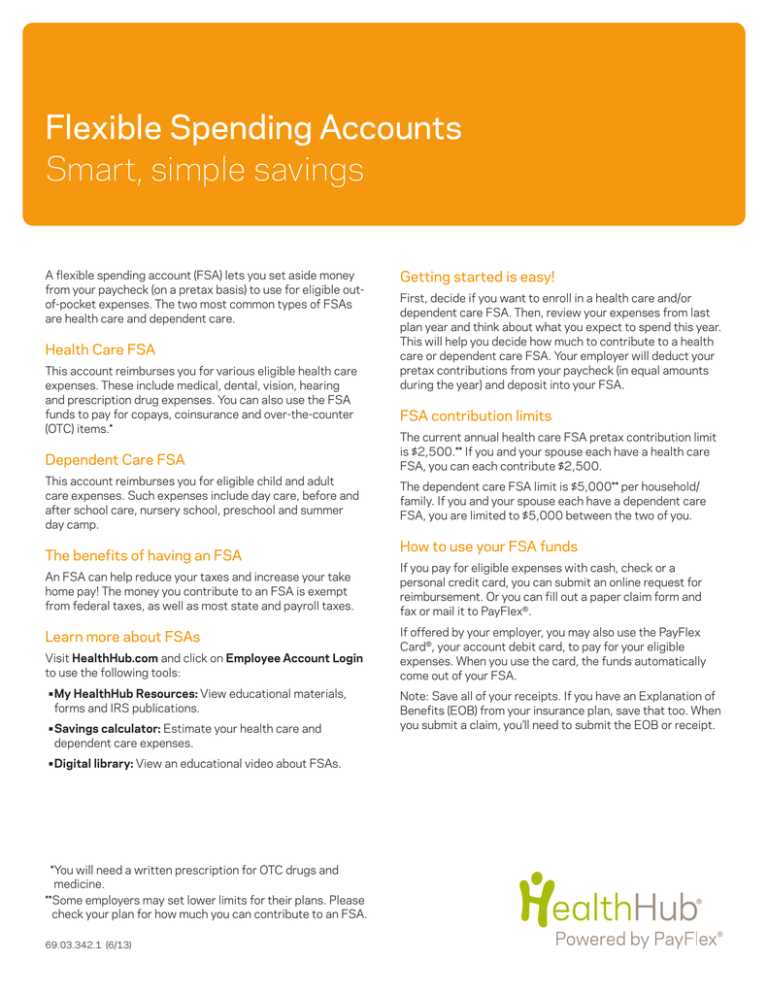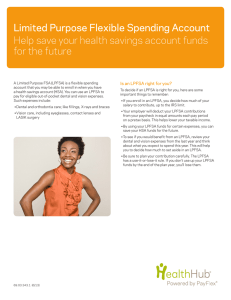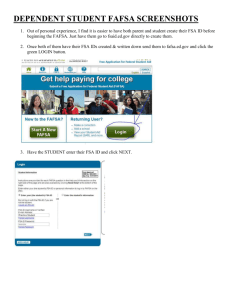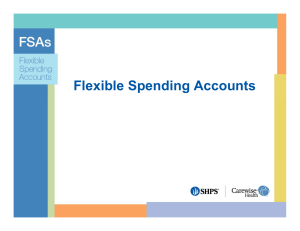Flexible Spending Accounts Smart, simple savings Getting started is easy!
advertisement

Flexible Spending Accounts Smart, simple savings A flexible spending account (FSA) lets you set aside money from your paycheck (on a pretax basis) to use for eligible outof-pocket expenses. The two most common types of FSAs are health care and dependent care. Health Care FSA This account reimburses you for various eligible health care expenses. These include medical, dental, vision, hearing and prescription drug expenses. You can also use the FSA funds to pay for copays, coinsurance and over-the-counter (OTC) items.* Dependent Care FSA This account reimburses you for eligible child and adult care expenses. Such expenses include day care, before and after school care, nursery school, preschool and summer day camp. The benefits of having an FSA An FSA can help reduce your taxes and increase your take home pay! The money you contribute to an FSA is exempt from federal taxes, as well as most state and payroll taxes. Learn more about FSAs Visit HealthHub.com and click on Employee Account Login to use the following tools: •My HealthHub Resources: View educational materials, forms and IRS publications. •Savings calculator: Estimate your health care and dependent care expenses. •Digital library: View an educational video about FSAs. *You will need a written prescription for OTC drugs and medicine. **Some employers may set lower limits for their plans. Please check your plan for how much you can contribute to an FSA. 69.03.342.1 (6/13) Getting started is easy! First, decide if you want to enroll in a health care and/or dependent care FSA. Then, review your expenses from last plan year and think about what you expect to spend this year. This will help you decide how much to contribute to a health care or dependent care FSA. Your employer will deduct your pretax contributions from your paycheck (in equal amounts during the year) and deposit into your FSA. FSA contribution limits The current annual health care FSA pretax contribution limit is $2,500.** If you and your spouse each have a health care FSA, you can each contribute $2,500. The dependent care FSA limit is $5,000** per household/ family. If you and your spouse each have a dependent care FSA, you are limited to $5,000 between the two of you. How to use your FSA funds If you pay for eligible expenses with cash, check or a personal credit card, you can submit an online request for reimbursement. Or you can fill out a paper claim form and fax or mail it to PayFlex®. If offered by your employer, you may also use the PayFlex Card®, your account debit card, to pay for your eligible expenses. When you use the card, the funds automatically come out of your FSA. Note: Save all of your receipts. If you have an Explanation of Benefits (EOB) from your insurance plan, save that too. When you submit a claim, you’ll need to submit the EOB or receipt. What you need to know about FSAs •FSAs have a use-it-or-lose-it rule. This means you forfeit any unused funds at the end of the plan year. –– If your plan has a grace period, you will have an additional 2 months and 15 days (after the plan year) to use your funds. –– If your plan has a run out period, you will have additional days (after the end of your plan year) to submit claims for reimbursement. Please confirm the length of your run out period with your employer. •You cannot change your contribution unless you have a change in status.* This may include a change in one or more of the following: –– Legal marital status (marriage, divorce, legal separation, annulment or death of a spouse) –– Number of tax dependents (birth, adoption or death) –– Employment status that affects eligibility –– Dependent satisfying or ceasing to satisfy coverage requirements (reaching limiting age, gain or loss of student status, marriage) •Specific to a dependent care FSA, you can change your contribution if: –– There is a change in your provider –– There is a change in the cost for a provider (unless this provider is a relative) Stay connected to your FSA When you have an FSA, you can sign up for various alerts on your account. These will help you stay up to date on your account activity. PayFlex Mobile™ app Your employer may offer the PayFlex Mobile application for virtually 24/7 access to your account. The PayFlex Mobile app is free and available for most smartphones. The app lets you: •Manage your account and submit claims •View your account balance, payments and deposits •Receive account alerts and submit documentation (if applicable) •View a list of common eligible expense items General health care expense information •You can only receive reimbursement for expenses incurred during the current plan year or grace period, if applicable. •Reimbursement is for eligible expenses incurred by you, your spouse and your dependents. •You cannot receive reimbursement for an eligible expense more than once. General dependent care expense information •Dependent care expenses must be for a qualifying person. This includes your dependent who is younger than age 13, or a spouse or dependent incapable of self-care. •To receive reimbursement, you must be working. If you are married, your spouse must either be working, looking for work, be a full-time student or incapable of self-care. •Expenses are reimbursed based on the amount available in your account. •Expense reimbursement is for services already received. Questions? Visit HealthHub.com. Or call us at 1-800-284-4885. Customer service representatives are available Monday through Friday from 7 a.m. to 7 p.m. CT and Saturday from 9 a.m. to 2 p.m. CT. *You must apply for a change in your election through your employer. You must submit your request generally within 30 days of your status change date. See your employer’s Summary Plan Description for specific details applicable to your plan. This material is for informational purposes only. The information describes the Flexible Spending Account (“FSA”) in general terms. FSA plans are governed by the rules of Section 125 of the Internal Revenue Code and will be administered in accordance with those rules. Estimate fund amounts carefully. Unused funds will be forfeited either after the last day of the plan year or at the end of the grace period if your plan offers one. Eligible expenses may vary from employer to employer. In case of a conflict between your plan documents and the information in this material, the plan documents will govern. Please refer to your employer’s Summary Plan Description (“SPD”) for more information about your covered benefits. Information is believed to be accurate as of the production date; however, it is subject to change. For more information about PayFlex, go to HealthHub.com. ©2013 PayFlex Systems USA, Inc. 69.03.342.1 (6/13)



